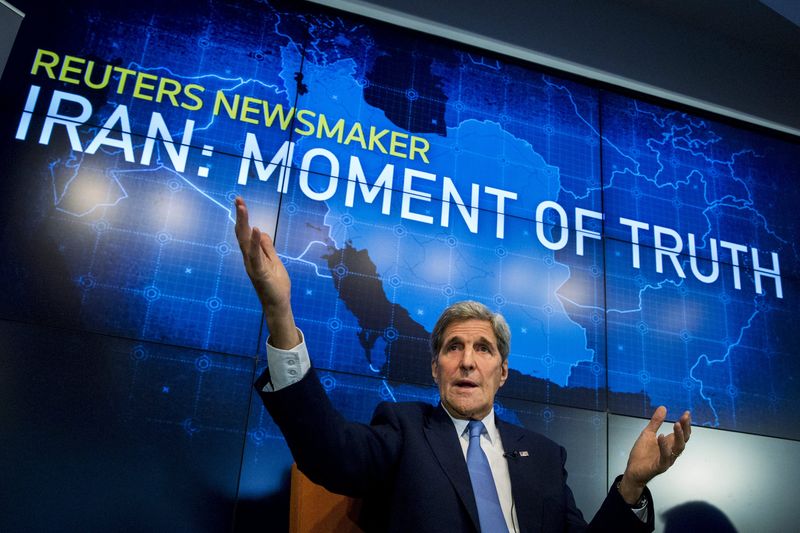By Warren Strobel
NEW YORK (Reuters) - If the United States walks away from the nuclear deal with Iran and demands that its allies comply with U.S. sanctions, a loss of confidence in U.S. leadership could threaten the dollar's position as the world's reserve currency, the top U.S. diplomat said on Tuesday.
"If we turn around and nix the deal and then tell them, 'You're going to have to obey our rules and sanctions anyway,' that is a recipe, very quickly ... for the American dollar to cease to be the reserve currency of the world," U.S. Secretary of State John Kerry said at a Reuters Newsmaker event.
Defending the July 14 Vienna agreement between Iran and world powers that he helped to negotiate, Kerry deployed a new argument in a feverish battle to prevent lawmakers from killing it. Congress has until Sept. 17 to act.
Kerry warned of a potential loss of U.S. financial and political clout. He said this was not something that would happen overnight but many countries were "chafing" under the present international financial arrangements.
He said U.S. Treasury experts "are doing a full dive on how this works and what the implications are. But the notion that we can just sort of diss the deal and unilaterally walk away as Congress wants to do will have a profound negative impact on people's sense of American leadership and reliability."
New York-based Boris Schlossberg, managing director of FX Strategy, BK Asset Management, challenged Kerry's reasoning. He said the dollar's status could be compromised only if the United States was unable to compete economically on a global scale.
"The reality of the situation is that the U.S. dollar hasn't been this strong in decades. The thought that it could be replaced as a reserve currency is laughable at this point on a geopolitical basis and nothing in the Iran deal even remotely touches upon that issue," he added.
Economists and financial analysts have often conjectured that a competing currency like the euro or the Chinese yuan will eventually dethrone the dollar as global trade and financial patterns shift. But the U.S. currency's position has been largely immune - mostly for lack of any good alternative.
KERRY, POINT BY POINT
In an hour-long moderated discussion, Kerry also:
* Acknowledged that the tone of the Iran debate had taken on a political edge.
President Barack Obama last week accused critics of the deal of making common cause with Iranian hardliners who chant "Death to America" and said some had beaten the drum for the Iraq war.
"You can squabble maybe with the choice of words," Kerry said when asked about Obama's comments. He stressed his view that the Iran deal should be argued on its merits. "I think the merits are very, very strong and I think the president does too," he said.
* Said it would be impossible for Iran to create a secret program for developing atomic fuel without the United States being able to detect it under the deal.
* Said the Iranians were open to discussing disputes in the Middle East, where Washington and its allies accuse Tehran of backing proxies in Iraq, Lebanon, Syria and Yemen.
"They said to me, 'If we can get this deal done, then we're ready to sit down and talk about the regional issues and we may be able to work things in different places,'" Kerry said. Iranian Foreign Minister Mohammad Javad Zarif is currently in Lebanon and had already visited Kuwait and Qatar in a bid to reach out, he said.
* Said violations by Iran of an arms embargo or restrictions on its missile program would not force an automatic return or "snapback" of United Nations sanctions under the nuclear deal, although other options would be available.
The agreement gives Tehran some relief from economic sanctions in return for strict limits on a nuclear program that the West has suspected was aimed at creating a nuclear bomb.

Tehran has long denied seeking a nuclear weapon and has insisted on the right to nuclear technology for peaceful means. Obama has never ruled out military force if negotiations failed, and has said that he and future presidents would still have that option if Iran quit the agreement.